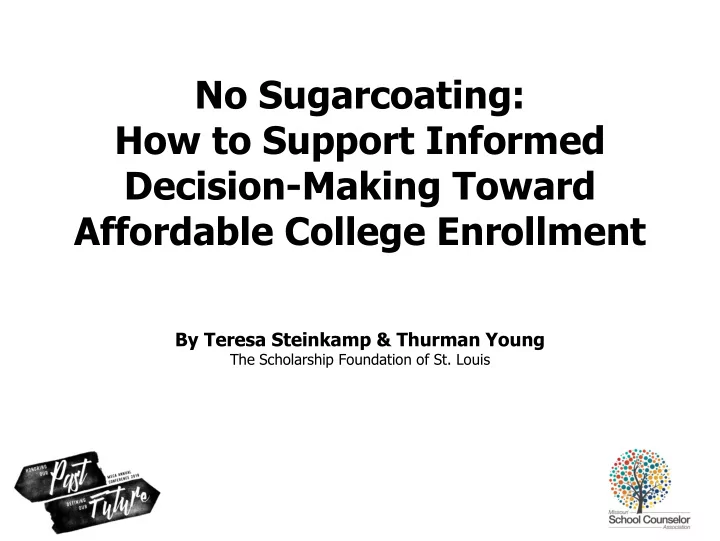

No Sugarcoating: How to Support Informed Decision-Making Toward Affordable College Enrollment By Teresa Steinkamp & Thurman Young The Scholarship Foundation of St. Louis
The Scholarship Foundation of St. Louis: Who we are and what we do. The Scholarship Foundation of St. Louis, a nonprofit organization founded in 1920, is based upon the • conviction that an educated society is essential to a healthy democracy. The Scholarship Foundation provides access to postsecondary education to members of our community who otherwise would not have the financial means to fulfill their educational goals. The Foundation sees higher education as a catalyst, an agent of change for individuals, families, • communities, and nations. We envision a community that recognizes the importance of educational attainment and assures positive educational outcomes are accessible to all regardless of economic circumstance. In our community, doors will not be closed to those who lack financial resources, and postsecondary education will be available to all with the potential to succeed. To build this community, The Scholarship Foundation will: Promote and provide financial support for postsecondary education; • Assure that students have the information necessary to make sound financial decisions; • Lead a collaborative network of community and educational partners aligned to support student • preparation, transition, and persistence to degree completion.
ASA Counselor Research: Key Findings • Only 11 percent of counselors say they are always aware of their students’ financial circumstances when discussing college affordability; 52 percent say they are often aware. • Less than 20 percent of counselors say they are extremely comfortable discussing the financial aid application process compared to 48 percent who are extremely comfortable discussing the college application process.
ASA Counselor Research: Key Findings Nearly half of school counselors are very or extremely likely to discourage a student from going to a college perceived as a poor academic fit; however, less than 30 percent report they are extremely or very likely to discourage a student from going to a school based on insufficient financial aid.
How many minutes do students spend, on average, with their school counselor in high school? 38 minutes
ASA Counselor Research: Key Findings
Scholarship Foundation: Awarding Philosophy • Interest-free loan and grant dollars awarded as last dollar; • Scholarship Foundation as only lender; • Regular, and ongoing, conversations regarding debt, student loans, and affordability.
Scholarship Foundation: Awarding Philosophy
Student-Centered Advising Emphasizes relationship • Allows authenticity • Promotes honesty • Centers objectivity • Does NOT direct, decide, or limit •
Advising Toward Informed Decision-Making Proactive, practical strategies • Assess financial aid offers; compare letters • Decision-Making: Using Award Letters to Assess Affordability • Assess carefully and ask questions; • Review critically for total in loans, any unmet need (gap); • Utilize as a foundation for critical conversation about annual and aggregate debt burden. • Engage in honest conversations: NO SUGARCOATING •
Advising Toward Informed Decision-Making 515 unique institutional award letters reviewed: • Complicated or confusing jargon and terminology • Total and complete cost omitted • No differentiation between aid types • Misleading packaging re: Parent PLUS loans • No, or unclear, definitions of work-study • Inconsistent calculations showing gap • Unclear or missing next steps •
What are the consequences of enrolling without sufficient financial aid? 1. Student incurs more loan debt than is desirable and/or manageable to repay comfortably. 2. Student is unable to pay full tuition bill for semester, which results in a back balance: Future enrollment at that institution is prohibited until balance is paid, usually paid in FULL. • Official transcripts are held “hostage” until the balance is paid, usually in FULL. • Renders student unable to enroll and/or transfer. • No financial support for back balances. •
Addressing Affordability Work with students one-on-one to complete FAFSAs • Engage early, and often, in conversations regarding affordability (cost of attendance/COA, expected • family contribution/EFC, etc.) Support verification proactively: • Request IRS Tax Transcripts for tax-filers unable to use the IRS DRT when filing a FAFSA • Request Verification of Non-Filing (VONF) for non-tax filers, especially parent non-filers •
For Your Consideration: Decision Day Celebrations For many students, a decision by May 1 st is irresponsible at best — damaging at worst. • For other students, they feel pressure to declare even when their decision is not solid. • What message does Decision Day send to students unable to make a decision due to a delayed award letter? • How might they offer an inclusive message around affordability? •
Resources Fudge, K., Lammers, J., & Lanza, A. (n.d.). School Counselors and College Financial Fit: Survey Results • (Publication). Retrieved October 23, 2018, from American Student Assistance website: https://www.asa.org/innovation/ Burd, S., Fishman, R., Keane, L., Habbert, J., Barrett, B., Dancy, K., . . . Williams, B. (n.d.). Decoding the • Cost of College: The Case for Transparent Financial Aid Award Letters . Retrieved October 23, 2018, from New America website: https://www.newamerica.org/education-policy/policy-papers/decoding-cost- college/
Contact Us! Teresa Stock Steinkamp, LMSW Thurman Young Advising Director Program Director (314) 932-6932 (314) 932-6922 Teresa@sfstl.org Thurman@sfstl.org
Recommend
More recommend